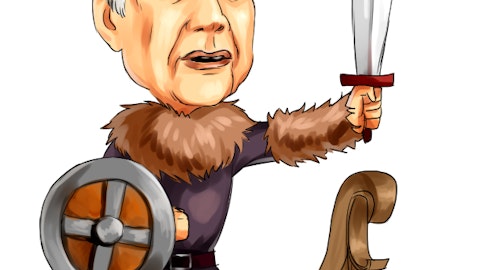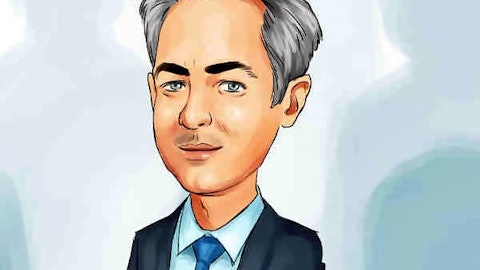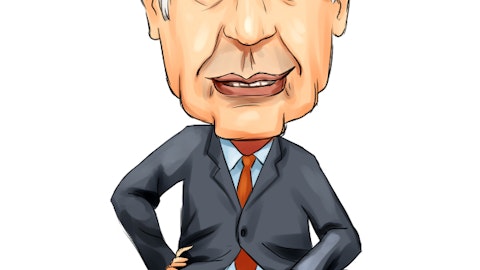Different metrics related to the performance of activist hedge funds suggest opposing conclusions regarding their outperformance over the last few years. For instance, Hedge Fund Research, which started tracking activist performance in 2008, reveals that activist hedge funds outperformed the S&P 500 benchmark in only three years during the past eight-year period. Other data and sources suggest that activists tend to greatly outperform both the broader market and the hedge fund industry in terms of absolute returns. HFR has only tracked activists for a relatively short period of time, which also coincided with a wild bull market, so it is no wonder why the hedged activists failed to consistently beat the market. With that in mind, this article will discuss three 13D (activist) filings submitted by two hedge fund firms tracked by Insider Monkey; two of these filings were filed by feared activist investor Carl Icahn.
Following activist funds is important because it is a very specific and focused strategy in which the investor doesn’t have to wait for catalysts to realize gains in the holding. An activist fund can simply create its own catalysts by pushing for them through negotiations with the company’s management and directors. In recent years, the average returns of activists’ hedge funds has been much higher than the returns of an average hedge fund. Furthermore, we believe do-it-yourself investors have an advantage over activist hedge fund investors because they don’t have to pay 2% of their assets and 20% of their gains every year to compensate hedge fund managers. We have found through extensive research that the top small-cap picks of hedge funds are also capable of generating high returns and built a system around this premise. In the 38 months since our small-cap strategy was launched it has returned 102% and beaten the S&P 500 ETF (SPY) by more than 53 percentage points (read more details).
Just a few days after disclosing an ownership stake of 6.56 million shares or 12.12% in Pep Boys-Manny Moe and Jack (NYSE:PBY), Carl Icahn of Icahn Enterprises L.P. made a proposal to buy the remaining outstanding shares of the company for $15.50 per share in cash. At the end of October, the automotive aftermarket service and retail chain announced that it had agreed to be bought by a subsidiary of Bridgestone Americas for $15.00 per share. Icahn Enterprises’ initial 13D on the company, which was filed on Friday, revealed that the activist firm was interested in acquiring Pep Boy’s retail automotive parts segment, outlining that it “presents an excellent synergistic acquisition opportunity of Auto Plus [a company wholly-owned by Icahn Enterprises]”. Meanwhile, shares of Pep Boys-Manny Moe and Jack (NYSE:PBY) are trading above the aforementioned offers, which might suggest that a bidding war between the two potential acquirers is imminent. Carl Icahn and his team seem to be in a more advantageous position to acquire the company at the moment, as their “proposal is not subject to any due diligence, financing or antitrust conditions”.
In the meantime, the number of hedge funds from our extensive database with positions in Pep Boys increased to 18 from 16 during the September quarter. These investment vehicles owned slightly more than 22% of the company’s outstanding common stock, while the value of their positions grew to $147.24 million from $119.33 million quarter-over-quarter. John Orrico’s Water Island Capital acquired a new stake of 1.53 million shares of Pep Boys-Manny Moe and Jack (NYSE:PBY) during the third quarter.
Follow Carl C. Icahn's Icahn Capital LP
Let’s head to the second page of this article, where we discuss Icahn’s freshly-upped stake in a struggling energy company and Bulldog Investors’ proposal in connection with a professional services company.
In a separate 13D filing, Icahn reported owning 32.65 million shares of Cheniere Energy Inc. (NYSEMKT:LNG), accounting for 13.83% of the company’s common stock. This compares with the 28.55 million-share position in the stock revealed by Icahn through the latest round of 13F filings. The billionaire activist investor put his money where his mouth is, after reiterating his bullish views on the energy sector at the DealBook conference in early November. “I don’t really mind them going down, because I know in my mind that I am going to buy more of them. I am waiting to buy more of these oil companies”, Icahn said at the conference. This move comes after the price of Asian liquefied natural gas (LNG) declined last week amid worries of sluggish demand and increased supply. Specifically, the price of Asian spot cargoes for January equaled $7.20 per million British thermal units (mmBtu) this week, down from $7.80 per mmBtu recorded two weeks ago.
Shares of Cheniere Energy Inc. (NYSEMKT:LNG) are down by 40% for the year, which has put significant weight on the performance of Icahn’s equity portfolio. At the same time, the energy company focused on LNG-related businesses failed to maintain investor interest during the third quarter among the hedge funds tracked by Insider Monkey. The number of smart money investors with stakes in Cheniere declined to 62 from 76 during the three-month period, while the overall value of these stakes shrunk by approximately 21% to $7.12 billion quarter-over-quarter. Andreas Halvorsen’s Viking Global holds a 13.06 million-share position in Cheniere Energy Inc. (NYSEMKT:LNG) as of September 30.
As stated by another 13D filing, Bulldog Investors, managed by Phillip Goldstein, Andrew Dakos and Steven Samuels, owns 3.93 million shares of Hill International Inc. (NYSE:HIL), which represent 7.63% of the company’s outstanding shares. Bulldog Investors upped its stake in the professional services firm by 228,171 shares over the past 60 days. More importantly, the investment firm “recommend that an investment banker be hired to pursue a liquidity event to maximize stockholder value including a sale of the Company”. Bulldog Investors revealed that D.C. Capital Partners made an offer to purchase Hill International Inc. (NYSE:HIL) for “not less than $5.50 per share” in early May, which represented a premium of more than 40% at that point in time, though Hill’s management rejected the buyout offer and outlined that it had a strategic plan that would increase shareholder value. Even so, the investment firm stated its discontent with Hill’s failure to increase shareholder value, saying that “we can’t see any reason to prefer management’s failed strategic plan over the sale of the company at $5.50 per share or higher”.
The stock is 17% in the red this year, but the hedge fund sentiment towards the struggling company did not change during the third quarter. Ten smart money investors monitored by the Insider Monkey team were invested in the company at the end of September, hoarding 9.80% of the company’s shares at that time. Nevertheless, the value of their investments dropped to $16.31 million from $41.55 million quarter-over-quarter. Peter Schliemann’s Rutabaga Capital Management cut its holding of Hill International Inc. (NYSE:HIL) by 18% during the July-to-September period, ending the quarter with 2.95 million shares.
Follow Phillip Goldstein, Andrew Dakos, And Rajeev Das's Bulldog Investors
Disclosure: None





